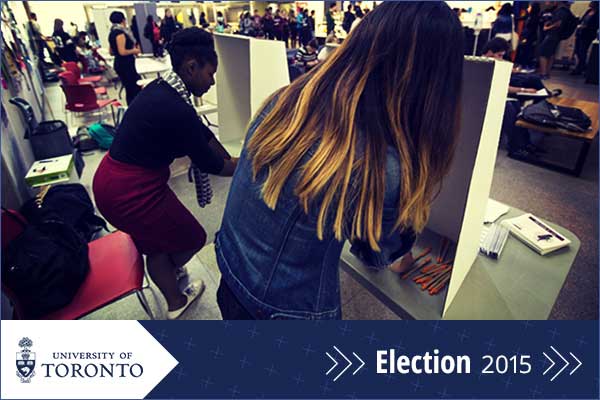
Election 2015: how should your vote count?
Published: October 1, 2015
The main federal opposition parties are advocating new ways of counting your vote in future elections, but Professor Peter Loewen suggests you don’t hold your breath waiting for them to happen.
U of T News has been asking experts from across the university for their analysis of the major issues, the debates, political advertising, public opinion polling and more, leading up to the Oct. 19 vote. Recent features have shared campaign analysis from researchers in statistics, economics, marketing, law and other disciplines.
See more Election 2015 coverage from U of T News
The three main national opposition parties – the Liberals, the NDP and the Green Party, are advocating the elimination of the so-called “first-past-the-post” system of declaring winners in ridings and replacing it with some form of proportional representation (PR).
U of T News asked Loewen, an associate professor of political science, to analyze the parties’ promises of electoral reform.
With the prospect of minority government a real one, the major opposition parties have each proposed new voting procedures. Is the first-past-the-post system (FPTP) nearing death?
No, I expect it will survive. First, it’s not clear to me that the Tories cannot survive. Second, should the Liberals and the NDP make some sort of governing arrangement, I think they will fundamentally disagree on reform. The NDP prefers a form of PR, while the Liberals probably (and this is an inference, but an informed one), prefer another majoritarian system, called Alternative Vote.
Can you explain the difference between the systems proposed by the Liberal and NDP parties? (The Greens said they would get input from an all-party committee before recommending changes).
To be sure, the Liberals have not come out in favour of a proportional system (by which we mean a system where the share of seats closely matches the share of votes). They have said that they will consider it, but they will also consider the Alternative Vote, a system in which voters’ first, second, third and more preferences are tallied until one candidate has a majority of the vote in a riding. This system, which is used in Australia, leads to results more like FPTP than like a PR system.
By contrast, the NDP supports something called Mixed Member Proportional, in which voters have two votes. The first vote elects a local representative, just like now. The second indicates a party preference. The share of the second votes a party receives determines how many seats they get in the legislature overall. The extra members required by these seats are drawn from lists of candidates made up by the parties.
You have written that any new system would need broad public support. Yet Ontarians, for example, rejected a new voting system in a referendum in 2007. How would this public support come about?
I think it is up to the parties and the parts of civil society that are advocating reform to build support among a majority of the population. Our electoral system is as important to our democracy as the two chambers of the Parliament of Canada. That it is not part of the constitution does not mean that we should change it without broad, deep, public support.
Voter turnout in 2011 was just 60.1 per cent. Would any new system increase the turnout?
Yes, but not impressively. The cross-national evidence suggests an increase of as much as 10 percentage points, but probably something more like five or six.
The NDP has said it wants to abolish the Senate, as have the Conservatives. Can an unelected Senate be effective? Or have the scandals soured Canadians on this once-valued institution?
It can certainly be effective. But that’s just one standard on which we might judge it. Were we redesigning our democracy, I don’t imagine, given what we know about democracy and given what we believe about equality, that we would choose this Senate again. Who wants a house of partisan appointees whose original goal was to protect the landed classes and to balance out the regions, which have since changed dramatically in import? No, we’d choose something elected and effective.
But it’s a long road to get there, and I am not convinced any party has articulated a clear plan on how to arrive at abolition or substantial reform.



